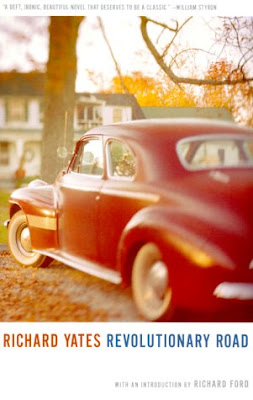Affluenza
El término "Affluenza" se ha puesto de moda a partir del libro del psicólogo Oliver James. Se trata de una gripe social, germinada en la sociedad de consumo, cuyo síntoma principal es confundir nuestros deseos con nuestras necesidades reales. Con mucho tino, Belinda Webb nos recuerda en un post en los blogs de The Guardian que los síntomas de la affluenza han sido descrito antes que Oliver James por una serie de escritores varias décadas antes. Entre ellos menciona a mi admirado Richard Yates y su muy aconsejable novela Vías Revolucionarias (en cuya versión fílmica aún no estrenada, por cierto, actuará mi adorada Kate Winslet)
Well, for starters, that master of prose Richard Yates perfectly exemplifies the frustrations of alienated labour in his 1961 novel Revolutionary Road. It portrays the stifling corporate conformity of the fifties, and centres on the deep frustrations and thwarted desires of characters Frank and April Wheeler. And Yates was only building on an earlier novel by Sloan Wilson, The Man in the Gray Flannel Suit, in which the main character has to decide whether to put sanity and his family's welbeing ahead of a high-flying yet soul-destroying career. The figure of the crumbling corporate yes man is also a main concern Arthur Miller's play Death of a Salesman and his novel, Focus. In Britain, there is George Orwell, who grappled with it through Gordon Comstock, the main character in my favourite of his novels, Keep the Aspidistra Flying. J G Ballard also brilliantly evoked the madness of alienated labour and commodity fetishism - sorry, affluenza - in his 1963 short story, The Subliminal Man. And Shakespeare, writing as he was at the dawn of capitalism as we know it, wrote much on money, not least the hypocrisies of The Merchant of Venice; which may explain why Marx was obsessed with our great playwright. I'm not saying that psychologists such as James don't serve a valuable role. That would be ludicrous. But literature, in my opinion, tells us much more. It highlights social ills and how they affect us better than any clinician could. As creative expression, often the antithesis of corporate conformity, it can help us identify those fears and feelings, and develop our own views of society. Then, of course, through awareness, it can inspire us enough to implement change. Of course, this is only possible when literature is engaged with, and not used just as escapism and pacification. When it comes to affluenza, I'd rather engage with the reading cure.
Etiquetas: eeuu, NOTICIA, oliver james, richard yates, vias revolucionarias






3:28 p. m.Le recuerdo, Sr. Thays, que la orden de restricción extendida a usted incluye menciones a mi persona en la WWW.
» Publicar un comentario